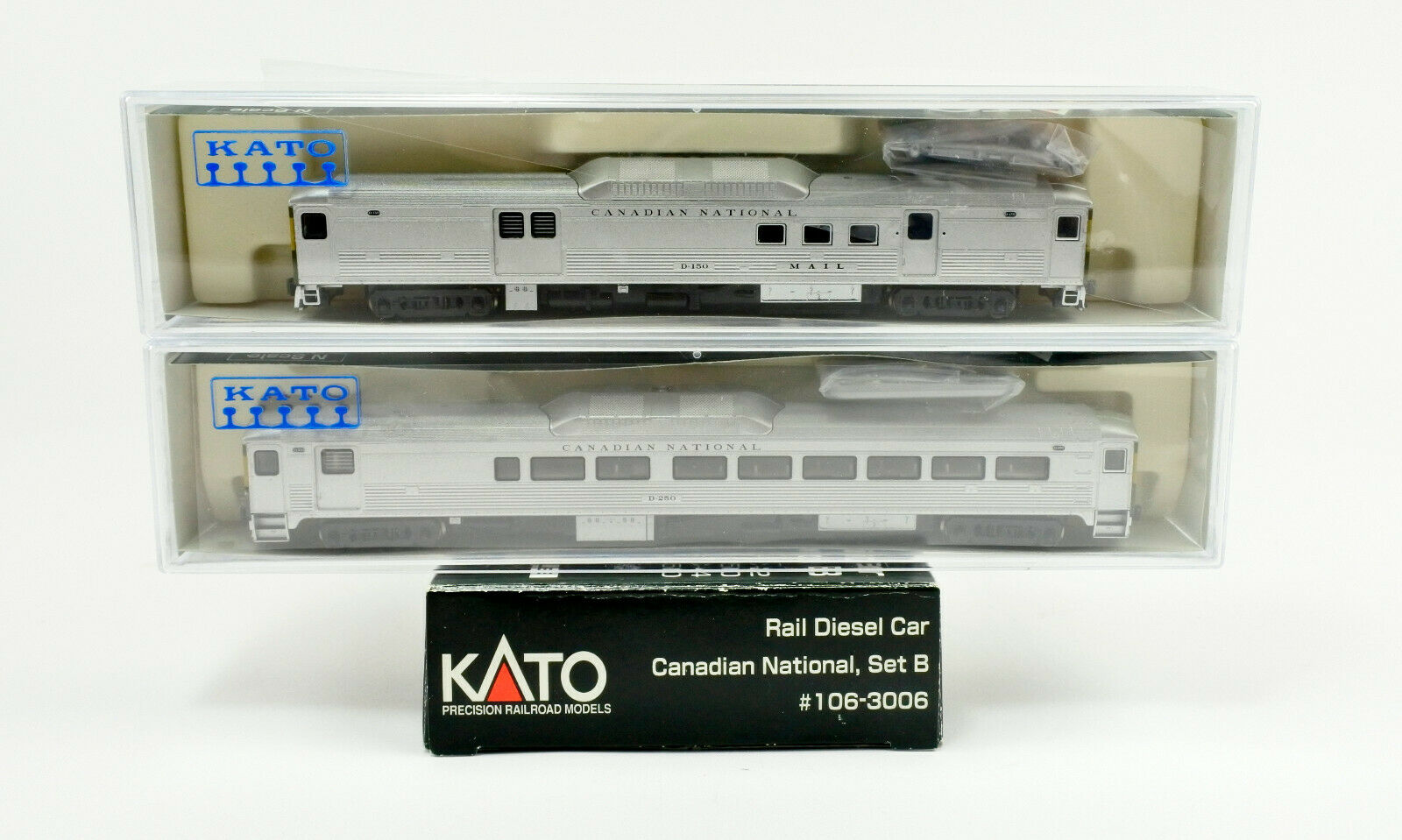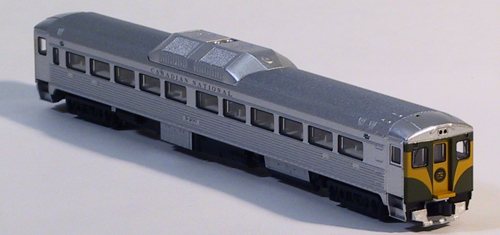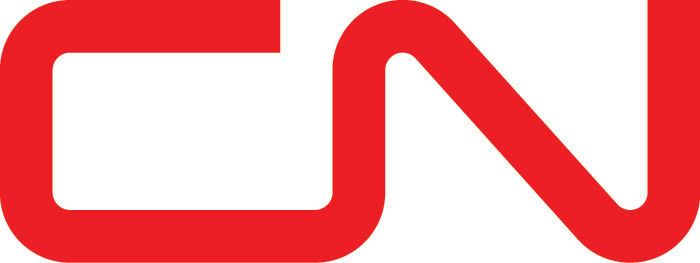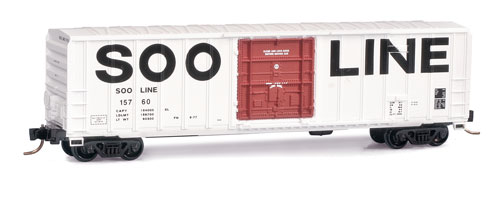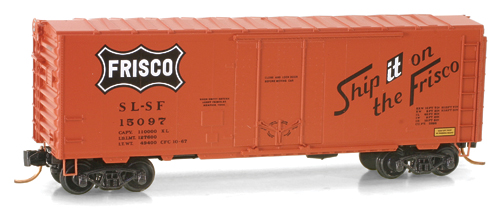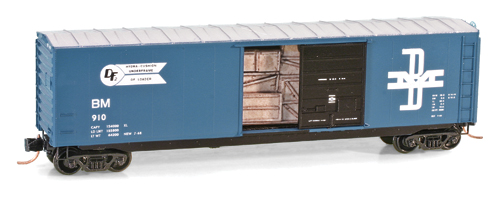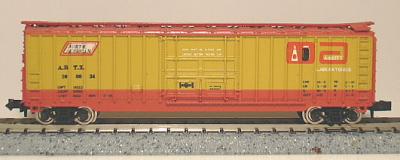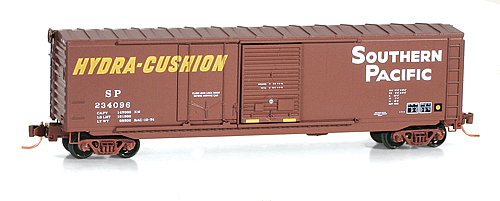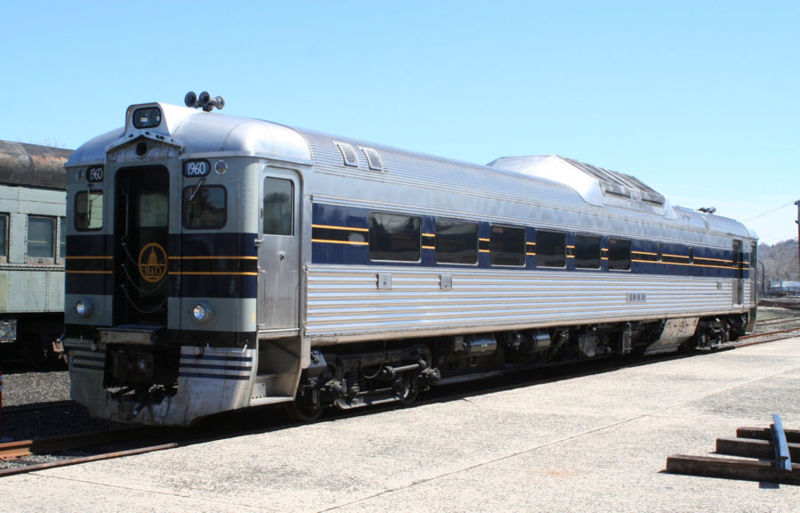Specific Item Information: RDC-2 250
RDC-4 150
During its travels, Budd's RDC-1 demonstrator made an appearance on the CN's Montreal-Quebec line. It evidently impressed the managers of the Canadian National significantly because later in 1953, the CN placed an order for its first RDC-3, intended to handle a daily 114 mile round trip run between newcastle and Fredericton, New Brunswick. Later in 1954, the CN purchased a RDC-1 and RDC-4 to run as a pair for the 115 mile run between Levis and Riviere du Loup, Quebec. These were sufficiently popular that the CN ordered more shortly after. The CN RDCs, known as "Railiners" were extremely popular and by the time Via Rail took over passenger services, the CN had an impressive fleet of RDCs.
RDC-4 150
During its travels, Budd's RDC-1 demonstrator made an appearance on the CN's Montreal-Quebec line. It evidently impressed the managers of the Canadian National significantly because later in 1953, the CN placed an order for its first RDC-3, intended to handle a daily 114 mile round trip run between newcastle and Fredericton, New Brunswick. Later in 1954, the CN purchased a RDC-1 and RDC-4 to run as a pair for the 115 mile run between Levis and Riviere du Loup, Quebec. These were sufficiently popular that the CN ordered more shortly after. The CN RDCs, known as "Railiners" were extremely popular and by the time Via Rail took over passenger services, the CN had an impressive fleet of RDCs.
Model Information: All models are motorized, have LED directional headlights, and KATO magnetic knuckle coupers. Interiors can be lighted with the optional #11-209 & #11-210 Interior Light Kit with White LED or #11-204 & #11-206 Interior Light Kit with bulb.
Click here for Kato RDC magazine ad
Click here for Kato RDC magazine ad
DCC Information: The RDC is DCC friendly for an installation of a Digitrax Digitrax DN143K2 Decoder. Not really drop-in, installation requires a lot of care.
Prototype History: This Single-car DMU is commonly known as the "RDC," the motorized Rail Diesel Car generally operated in rural areas where ridership and mail/parcel transport were too low for regular passenger train service. When first introduced, the RDC was also proclaimed to be the savior of branch line and suburban service. It was heavily used as a commuter service workhorse (and still is currently in some locations!).
The Budd Company rolled out the first RDC in the fall of 1949, a single RDC-1 "Budd Demonstrator." Hundreds more would eventually follow for service to railroads throughout North America and around the world (including South America, Australia, Saudi Arabia and even Cuba!). Oddly enough, it was Budd's experience in the production of small yet powerful diesel engines for WWII tanks that eventually lead to the birth of the RDC.
A total of 398 units were built. The RDC utilized two compact motors mounted under the car's floor to drive one axle on each truck. Capable of being operated by a motorman from either end of the car, these units could be used independently or combined to create a two- or three-unit consist. These railcars cold achieve as top speed of 85mph
A review of the Budd roster reveals that many RDC cars were operated well into the 1970's and early 1980's, with a small number still in service today!
Four standardized designs were created to reduce the time and expense of custom production
- RDC-1 was strictly passenger-oriented, containing 90 coach seats.
- RDC-2 contained 71 seats and a separate baggage area.
- RDC-3 combined a Railway Post Office with a baggage compartment and 49 seats.
- RDC-4 was a self-contained RPO-Express car.
Read more on Wikipedia.
The Budd Company rolled out the first RDC in the fall of 1949, a single RDC-1 "Budd Demonstrator." Hundreds more would eventually follow for service to railroads throughout North America and around the world (including South America, Australia, Saudi Arabia and even Cuba!). Oddly enough, it was Budd's experience in the production of small yet powerful diesel engines for WWII tanks that eventually lead to the birth of the RDC.
A total of 398 units were built. The RDC utilized two compact motors mounted under the car's floor to drive one axle on each truck. Capable of being operated by a motorman from either end of the car, these units could be used independently or combined to create a two- or three-unit consist. These railcars cold achieve as top speed of 85mph
A review of the Budd roster reveals that many RDC cars were operated well into the 1970's and early 1980's, with a small number still in service today!
Four standardized designs were created to reduce the time and expense of custom production
- RDC-1 was strictly passenger-oriented, containing 90 coach seats.
- RDC-2 contained 71 seats and a separate baggage area.
- RDC-3 combined a Railway Post Office with a baggage compartment and 49 seats.
- RDC-4 was a self-contained RPO-Express car.
Read more on Wikipedia.
Road Name History: The Canadian National Railway Company (reporting mark CN) is a Canadian Class I railway headquartered in Montreal, Quebec that serves Canada and the Midwestern and Southern United States. CN's slogan is "North America's Railroad". CN is a public company with 24,000 employees. It had a market capitalization of 32 billion CAD in 2011. CN was government-owned, having been a Canadian Crown corporation from its founding to its privatization in 1995. Bill Gates was, in 2011, the largest single shareholder of CN stock.
CN is the largest railway in Canada, in terms of both revenue and the physical size of its rail network, and is currently Canada's only transcontinental railway company, spanning Canada from the Atlantic coast in Nova Scotia to the Pacific coast in British Columbia. Its range once reached across the island of Newfoundland until 1988, when the Newfoundland Railway was abandoned.
Following CN's purchase of Illinois Central (IC) and a number of smaller US railways, it also has extensive trackage in the central United States along the Mississippi River valley from the Great Lakes to the Gulf of Mexico. Today, CN owns about 20,400 route miles (32,831 km) of track in 8 provinces (the only two not served by CN are Newfoundland & Labrador and Prince Edward Island), as well as a 70-mile (113 km) stretch of track (see Mackenzie Northern Railway) into the Northwest Territories to Hay River on the southern shore of Great Slave Lake; it is the northernmost rail line anywhere within the North American Rail Network, as far north as Anchorage, Alaska (although the Alaska Railroad goes further north than this, it is isolated from the rest of the rail network).
The railway was referred to as the Canadian National Railways (CNR) between 1918 and 1960, and as Canadian National/Canadien National (CN) from 1960 to the present.
Read more on Wikipedia.
CN is the largest railway in Canada, in terms of both revenue and the physical size of its rail network, and is currently Canada's only transcontinental railway company, spanning Canada from the Atlantic coast in Nova Scotia to the Pacific coast in British Columbia. Its range once reached across the island of Newfoundland until 1988, when the Newfoundland Railway was abandoned.
Following CN's purchase of Illinois Central (IC) and a number of smaller US railways, it also has extensive trackage in the central United States along the Mississippi River valley from the Great Lakes to the Gulf of Mexico. Today, CN owns about 20,400 route miles (32,831 km) of track in 8 provinces (the only two not served by CN are Newfoundland & Labrador and Prince Edward Island), as well as a 70-mile (113 km) stretch of track (see Mackenzie Northern Railway) into the Northwest Territories to Hay River on the southern shore of Great Slave Lake; it is the northernmost rail line anywhere within the North American Rail Network, as far north as Anchorage, Alaska (although the Alaska Railroad goes further north than this, it is isolated from the rest of the rail network).
The railway was referred to as the Canadian National Railways (CNR) between 1918 and 1960, and as Canadian National/Canadien National (CN) from 1960 to the present.
Read more on Wikipedia.
Brand/Importer Information: KATO U.S.A. was established in 1986, with the first U.S. locomotive model (the GP38-2, in N-Scale) released in 1987. Since that time, KATO has come to be known as one of the leading manufacturers of precision railroad products for the modeling community. KATO's parent company, Sekisui Kinzoku Co., Ltd., is headquartered in Tokyo, Japan.
In addition to producing ready-to-run HO and N scale models that are universally hailed for their high level of detail, craftsmanship and operation, KATO also manufactures UNITRACK. UNITRACK is the finest rail & roadbed modular track system available to modelers today. With the track and roadbed integrated into a single piece, UNITRACK features a nickel-silver rail and a realistic-looking roadbed. Patented UNIJOINERS allow sections to be snapped together quickly and securely, time after time if necessary.
The Kato U.S.A. office and warehouse facility is located in Schaumburg, Illinois, approximately 30 miles northwest of Chicago. All research & development of new North American products is performed here, in addition to the sales and distribution of merchandise to a vast network of wholesale representatives and retail dealers. Models requiring service sent in by hobbyists are usually attended to at this location as well. The manufacturing of all KATO products is performed in Japan.
Supporters of KATO should note that there is currently no showroom or operating exhibit of models at the Schaumburg facility. Furthermore, model parts are the only merchandise sold directly to consumers. (Please view the Parts Catalog of this website for more specific information.)
In addition to producing ready-to-run HO and N scale models that are universally hailed for their high level of detail, craftsmanship and operation, KATO also manufactures UNITRACK. UNITRACK is the finest rail & roadbed modular track system available to modelers today. With the track and roadbed integrated into a single piece, UNITRACK features a nickel-silver rail and a realistic-looking roadbed. Patented UNIJOINERS allow sections to be snapped together quickly and securely, time after time if necessary.
The Kato U.S.A. office and warehouse facility is located in Schaumburg, Illinois, approximately 30 miles northwest of Chicago. All research & development of new North American products is performed here, in addition to the sales and distribution of merchandise to a vast network of wholesale representatives and retail dealers. Models requiring service sent in by hobbyists are usually attended to at this location as well. The manufacturing of all KATO products is performed in Japan.
Supporters of KATO should note that there is currently no showroom or operating exhibit of models at the Schaumburg facility. Furthermore, model parts are the only merchandise sold directly to consumers. (Please view the Parts Catalog of this website for more specific information.)
Item created by: Powderman on 2021-12-21 15:18:48
If you see errors or missing data in this entry, please feel free to log in and edit it. Anyone with a Gmail account can log in instantly.
If you see errors or missing data in this entry, please feel free to log in and edit it. Anyone with a Gmail account can log in instantly.


